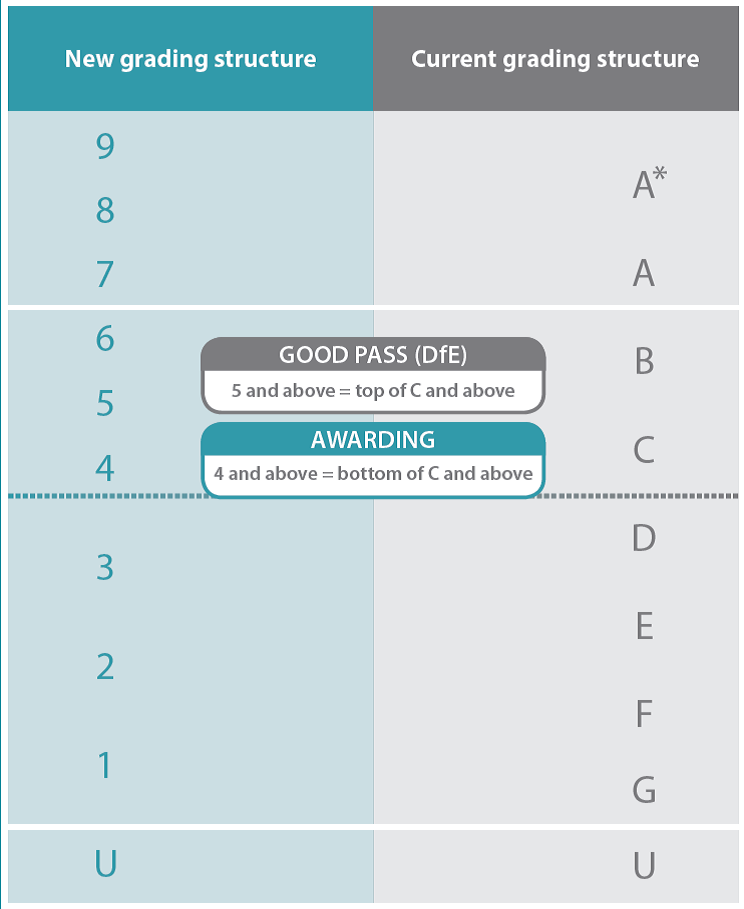GCSE and Progress 8
Qualification Reforms
GCSEs in England, Wales and Northern Ireland
Grading New GCSEs from 2017
GCSE content and grading are in their second year of the process of being overhauled as directed by the government. New courses in English and Maths have already started for our current year 11s, with a second wave of new subject qualifications starting for current year 10s and the third and final wave of new qualifications to be introduced for the current year 9s. This means that current year 10s will study a mixture of current and new GCSEs. Current year 7, 8 and 9 students will study only new GCSEs.
As the content of these subjects change, so does the grading system. It changes from A* to G grades to 9 to 1. How these grades relate to each other is shown to the left.
According to the DfE a goo d pass is currently considered to be a C or better. When the new grading structure comes in a good pass will be a grade 5 or better.
d pass is currently considered to be a C or better. When the new grading structure comes in a good pass will be a grade 5 or better.
As a school we recognise that progress is as important as attainment. A grade 5 or C grade is not a good pass for a student who should have achieved an A; conversely a D grade or grade 3 may well represent good progress for some students. We are pleased that the government also recognises that and will be using student progress to measure schools’ effectiveness from September 2016.
https://www.gov.uk/government/news/new-gcse-9-to-1-grades-coming-soon
Please click here for student information on GCSE grading is changing in 2017 - ASCL (1)
Please click her for parent information on GCSE grading is changing in 2017 - ASCL (2)
Progress 8 and Attainment 8
Attainment 8
Each qualification your child takes in Key Stage 4 (GCSE) is worth a number of points.
Attainment 8 is the average number of points your child achieves across a set of eight Government approved qualifications.
The eight approved qualifications can be a combination of:
- English (compulsory and worth double points);
- Mathematics (compulsory and worth double points);
- Three other English Baccalaureate (EBacc) subjects which are generally sciences, computer science, geography, history and languages
- Three further subjects, which can be from the range of EBacc subjects, or can be any other GCSE or approved, high-value arts, academic, or vocational qualifications.
Your child doesn’t have to study for eight qualifications, but if they don’t, or if the qualification they are studying for is not from the bucket of qualifications approved by the Government, then they will not get any points for it.
Progress 8
Progress 8 is a number that tells you how much progress your child makes from the end of primary school to the end of secondary school.
It compares your child’s achievements in a set of eight qualifications with those of children in other schools with the same ‘starting point’ which is based on their assessment results at the end of primary school.
The Progress 8 score will range from -1.0 to +1.0.
Because the Progress 8 score compares how much progress your child is making with other children, a score of zero does not mean that your child is not making any progress, it means that they are making a similar level of progress to children in other schools who had the same ‘starting point’. A positive score means they are making more progress and a negative score that they are making less. 
Progress 8 scores for individual children are then added together and an average can be worked out for the whole school. This will give you an idea of whether, as a group, children in your child’s school are making more or less progress compared to similar pupils in other schools.
The Department for Education have created this three minute video to help explain what Progress 8 is all about.
//www.youtube.com/embed/4IAEgFMSGDY#t=0.5
How can you use Progress and Attainment 8?
Progress and Attainment 8 measures are there to measures school performance, rather than an individual child’s performance, although your child’s individual results are used to calculate the measure. If you’re curious about your child’s individual scores, you can ask for more information from their teachers.
The Progress and Attainment 8 scores for a school give you an indication of how well a school is supporting their students across a broad range of subjects and across all levels of ability.
The Department for Education and local authorities will use the scores to see where schools need support to improve.
Where to go for more information
Contact Us
If you have any questions about progress 8 and what it means for your child, please do not hesitate to contact the school via the following routes:
Email:principal@wyedean.gloucs.sch.uk – please include Progress 8 F.A.O Ms Williams in the subject bar.
Further information
For more information about how Progress 8 works and how it could affect your child, you may find the following helpful:
Video: progress 8 (explained in 3 minutes) – YouTube. Please click HERE.
Progress 8 – AQA (an exam board) Please click HERE
Fact sheet on Progress 8 – Department for Education. Please click HERE.
List of EBacc qualifications – Department for Education. Please click HERE.
Schools’ Progress 8 scores will be published in the secondary school performance tables:
Find and compare schools in England – GOV.UK. Please click HERE.

